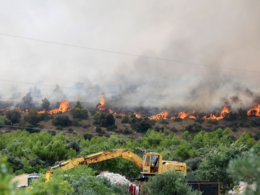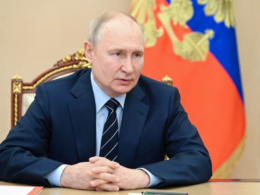Brent has risen to about $140 per barrel, the highest level since 2008.
The price of crude oil has risen by more than $10 a barrel, and stocks have fallen sharply as the conflict in Ukraine worsened, despite mounting calls for more sanctions against Russia.
Early Monday, Brent crude oil jumped more than $10. The price of benchmark US crude was about $9 higher, at more than $124 per barrel.
The escalation came after Russian President Vladimir Putin warned that Ukrainian sovereignty was in jeopardy as Russian forces bombarded vital places. Over the weekend, a brief ceasefire in two Ukrainian cities crumbled, with both sides blaming each other.
Oil prices fell further as Libya’s national oil company reported an armed group had shut down two critical oilfields. The country’s daily oil output fell by 330,000 barrels as a result of the change.
Meanwhile, US House of Representatives Speaker Nancy Pelosi said the House was considering legislation to further isolate Russia from the global economy, including a restriction on the import of Russian oil and energy products into the US.
US crude had risen $9.08 to $124.74 per barrel in electronic trading on the New York Mercantile Exchange by late morning in Tokyo. The all-time high was reached in July 2008, when the price of US crude rose to $145.29.
This put the average price of gasoline in the United States above $4 per gallon; a mark hit earlier in 2008. According to the AAA motor club, the average price of regular gasoline in the United States surpassed $4 per gallon (3.8 liters) on Sunday for the first time since 2008.
On July 17, 2008, the all-time high for average gasoline prices was $4.10 per gallon. Brent crude, the international pricing benchmark, peaked at $139.13 per barrel on Friday before dropping down on Monday. It was trading at $128.67 per barrel, up to $10.56.
On Wall Street, US futures slumped, with the benchmark S&P 500 contract losing 1.6 percent and the Dow industrials contract plunging 1.3 percent. European stock futures have also fallen.
Higher fuel prices are disastrous for Japan, which imports nearly all of its energy. The Nikkei 225, Japan’s benchmark index, fell 3.5 percent in morning trading to 25,091.93.
The Hang Seng in Hong Kong fell 4% to 21,021.38, while the Kospi in South Korea fell 2.5 percent to 2,648.48. The S&P/ASX 200 in Australia fell 1.2 percent to 7,023.10, while the Shanghai Composite fell roughly 0.8 percent to 3,421.81.
“The Ukraine-Russia conflict will continue to dominate market attitudes, and with no signs of conflict settlement thus far, risk sentiments will likely be capped into the next week,” said Yeap Jun Rong, market strategist at IG in Singapore.
“It should be evident by now that economic sanctions will not prevent Russian aggression, but will instead function as a punitive measure at the price of global economic progress.” High oil costs may jeopardize firms’ profitability and the outlook for consumer spending.”
According to some observers, restricting Russian oil will not inevitably hurt Moscow. Read Latest News Russia withdraw troops from Ukraine-demands Russia
“If Russia gets to export a third less of its oil and has to accept a discount on it, but oil prices are substantially higher, they might actually net positive on the oil side and comparable on other commodities,” said Josh Young, a chief investment officer of oil and gas equity investment firm Bison Interests.
Markets around the world have recently swung wildly due to concerns about how high prices for oil, wheat, and other commodities produced in the region will rise as a result of Russia’s invasion, exacerbating the world’s already high inflation.
Companies such as Mastercard and Visa, as well as Netflix, have left Russia. The Ukraine conflict also threatens food supplies in several places, including Europe, Africa, and Asia, which rely on the large, fertile farmlands of the Black Sea region, known as the “breadbasket of the world.”









